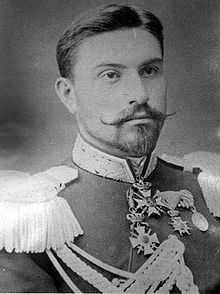Racho Petrov
From Wikipedia, the free encyclopedia
| Racho Petrov Рачо Петров | |
|---|---|
 | |
| 12th Prime Minister of Bulgaria | |
| In office 25 January 1901 – 5 March 1901 | |
| Monarch | Ferdinand |
| Preceded by | Todor Ivanchov |
| Succeeded by | Petko Karavelov |
| In office 19 May 1903 – 5 November 1906 | |
| Monarch | Ferdinand |
| Preceded by | Stoyan Danev |
| Succeeded by | Dimitar Petkov |
| Chief of the General Staff | |
| In office 9 September 1885 – 29 April 1887 | |
| Monarch | Alexander |
| Preceded by | Office Established |
| Succeeded by | Stefan Paprikov |
| In office 23 October 1887 – 15 April 1894 | |
| Monarch | Ferdinand |
| Preceded by | Stefan Paprikov |
| Succeeded by | Nikola Ivanov |
| War Minister | |
| In office 10 July 1887 – 1 September 1887 | |
| Monarch | Ferdinand |
| Preceded by | Danail Nikolaev |
| Succeeded by | Sava Mutkurov |
| In office 27 April 1894 – 29 November 1896 | |
| Monarch | Ferdinand |
| Preceded by | Mikhail Savov |
| Succeeded by | Nikola Ivanov |
| Minister of Interior | |
| In office 10 December 1900 – 4 March 1901 | |
| Monarch | Ferdinand |
| Preceded by | Vasil Radoslavov |
| Succeeded by | Mihail Sarafov |
| Minister of Foreign Affairs | |
| In office 21 January 1901 – 4 March 1901 | |
| Monarch | Ferdinand |
| Preceded by | Dimitar Tonchev |
| Succeeded by | Stoyan Danev |
| In office 18 May 1903 – 4 November 1906 | |
| Monarch | Ferdinand |
| Preceded by | Stoyan Danev |
| Succeeded by | Dimitar Petkov |
| Personal details | |
| Born | 3 March 1861 Shumen, Ottoman Empire |
| Died | 22 January 1942 (aged 80) Belovo, Bulgaria |
| Military service | |
| Allegiance | Bulgarian Army |
| Years of service | 1878—1917 |
| Rank | General of the Infantry |
| Battles/wars | Serbo-Bulgarian War, First Balkan War, Second Balkan War, Balkans Campaign (World War I) |
Racho Petrov Stoyanov (Bulgarian: Рачо Петров Стоянов) (3 March 1861, in Shumen – 22 January 1942) was a leading Bulgarian general and politician.
A talented soldier, Petrov was appointed to be Chief of General Staff at the age of 24 and was Minister of Defence at 27.[1] During the First World War he served as Chief of the 4th Army.
As a politician he twice served as Prime Minister of Bulgaria as the non-party head of an interim administration and then for a longer period from 1903–1906, having been appointed for fear of war after a Bulgarian insurrection in Ottoman Macedonia.
Notes
- ↑ Standart News - Archive | Wednesday, 3 May 2006 at www.standartnews.com
See also
|
This article is issued from Wikipedia. The text is available under the Creative Commons Attribution/Share Alike; additional terms may apply for the media files.